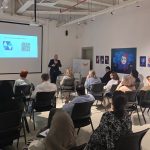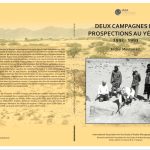The scientific potentials of self-confinement in the Arabian Peninsula
- admcef22
- January 30, 2023
April 22, 2020
As a social scientist carrying out field work in the Arabian Peninsula, I am used to navigating between periods of seclusion, and others of intense social contact with colleagues, informants or interviewees. By all standards, working on my own in my Omani air conditioned home office for the last month and a half has not been a traumatizing experience. Evidently, colleagues from Sultan Qaboos University where I am an invited researcher are surely missed. Nevertheless, should confinement last much longer, I will be able to bear with it. It is in a way reminiscent of nostalgic times when I was wrapping up my doctoral thesis or a monograph, and when I made myself believe deadlines only seemed to exist to be postponed !
Nevertheless, I personally spot a range of meaningful differences between these moments and the one we are all experiencing due to the pandemic. Currently, I should be in the process of accumulating data, not of disseminating my findings. Not having a large scale writing project, I have decided that this time of confinement could usefully be focused on writing short papers, book reviews or on peer-reviewing articles. I am also busy wrapping up the next issue of Arabian Humanities, the peer-reviewed journal of the CEFAS. One always has more than expected on his plate !
Yet, professionally, there is much more to the current context than just making up for lost time. To me, there is clear scientific added value to being based here in such a perplexing context. I believe it would be wrong to consider that residing in the Peninsula is now made senseless due to the lockdown and that I may as well be relocated in France. Experiencing confinement in Muscat (with one eye looking into what is happening in Yemen) is not without generating new insights, analysis and problematics. It feeds new reflections on public policies, social dynamics and other matters. Indeed, the coronavirus pandemic is to be seen as a truly holistic issue, highlighting a number of characteristics of the region that had somehow remained in the blind spot. Even though I spend the vast majority of my time at home, I think the crisis, despite the drama it generates for many, is also breeding important creativity for social scientists who are in the position to observe many meaningful dynamics. For that reason, the Arabian Peninsula remains a fascinating vantage point.
I understand how fortunate I am to be able to count on my spouse (and e-learning !) to manage most of our confined childrens’ activities and other household tasks. I thus wonder how different my own experience of confinement would have been had I been confronted to the ‘maternal wall” recently analysed by Alessandra Minello in Nature. Measuring the amplitude of this gender gap is certainly something that will affect my own interactions with colleagues in the coming days and in the future.
The intensive use of video-conferences is also giving our scientific community food for thought. I have long been thinking about my own mobility as a researcher : long travels to give lectures or to present papers have increasingly been making me uneasy, not just for environmental and financial reasons, but also because they consume loads of personal energy and impose absence from home. I had decided this year to reduce my travels and had already severely limited my time in planes, suggesting colleagues to organize online participation to seminars, lectures or conferences. To my surprise, my proposals were sometimes met with lukewarm answers from certain universities, or even with refusals. I am, in a way, glad to see that the sanitary crisis is imposing a new norm for communication – one that is clearly imperfect but has many assets. Following an initiative of the CEFAS, the development of a cross-border online-seminar on the social and political responses to Covid-19 across the Arab world is in itself a welcome development. It shows just how much confinement, for us who are fortunate to remain healthy, can be used to rethink a number of our professional practices.
Voir en ligne : Pour plus de billets sur le COVID-19 dans la péninsule Arabique






